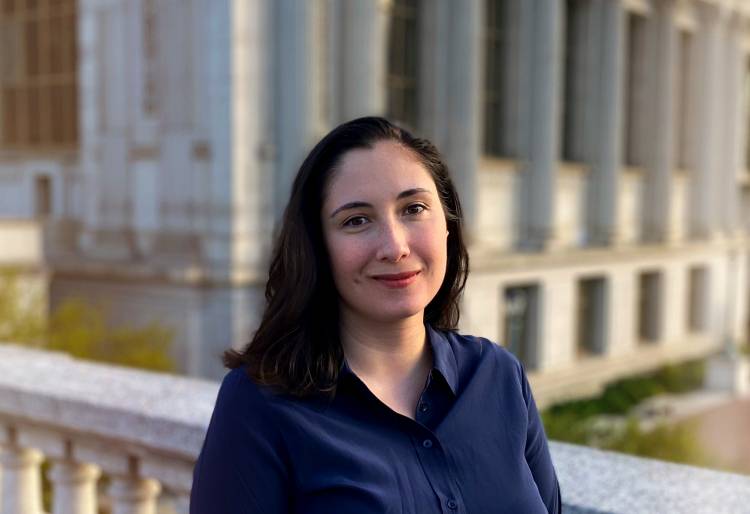 Why don’t you tell us a little bit about yourself?
Why don’t you tell us a little bit about yourself?
I was born in Plovdiv, Bulgaria and raised in Brussels, Belgium. I earned a master’s degree in law from SciencesPo Paris in 2017 after a bachelor’s from the same institution. Then, I worked at an international law firm in Paris on intellectual property issues, and at the European Commission on copyright legislation. In 2019, I earned my LL.M. degree from UC Berkeley School of Law and passed the California bar exam that year. Now, I am working as an associate in a major US law firm in San Francisco.
As a former LL.M. student, how do you suggest incoming students approach their studies?
Once you’ve selected the law school you will be attending as an LL.M. student, it’s important to make an organized plan of what you wish to achieve during this year. Some students prefer to take the minimum required classes and focus their efforts on legal clinics and practical experience, while others prefer to focus on academic work. Some law schools offer additional certificates of specialization to the JD and LL.M. degrees that show that the student has developed expertise in a specific field. It is always good to have such certificates, especially for job applications.
Once you’ve selected all your courses, it’s important to focus on doing the work on a continuous basis: US law courses are known for having a lot of readings and surprise in-class questioning, so come prepared for every class.
What are some aspects of the US LL.M. experience that might not be apparent to international students?
Whatever courses you decide to take, you should know that grades matter. If you decide to apply for jobs in the US your transcript will be reviewed by the hiring manager of the company or law firm you’ve applied to, and your grades will determine, in part, the strength of your application. Do not take courses that you are not sure are relevant to your overall plan or that you are simply not interested in. There are plenty of courses to choose from, including the mandatory bar courses.
If one of your classes has a writing component, write about a legal topic that is new and exciting, or one that has little written about it. This way, you can publish your research paper in the law school journal of your school or in another publication.
What about the bar exam?
Most LL.M. students that choose to take a bar exam in the US go for either the New York or the California bar exams. The California bar exam is notoriously difficult and the success rate of LL.M. students’ performance is very low. You should sign up for a bar prep company, preferably in the fall semester when the price rates are still relatively cheap. Once you graduate and you sit down to study for the bar exam in the summer, you should aim to complete as close to 100 percent of the bar prep course as possible.
There is no magic trick in passing the bar exam. The key is to put in the required work on a consistent basis. Ideally, you would have taken some bar required courses (like Evidence, Civil Procedure, Contracts and Constitutional Law) during your LL.M. and this would ease the studying of the same material during your bar preparation. In addition, if you decide to take the California Bar Exam, it’s recommended to take the Multistate Professional Responsibility Examination (MPRE) before the bar exam. Since the topic of Professional Responsibility is tested on the essay portion of the California bar exam, if you’ve already learned the material for the MPRE in the spring it is much easier to simply refresh your memory on the topic when studying for the bar instead of memorizing it for the first time.
Do you have any tips for how to land a post-LL.M. job in the US?
While most LL.M. students eventually return to their home countries after their LL.M., some decide to stay and attempt to find a professional opportunity in the United States. This could be very tricky: LL.M. students are often competing with JD students, and it is often difficult to translate your prior experience from your home country to relevant experience for the US legal job market.
On-campus professional development and career advice centers are your best resource in your preparation for job hunting. In addition, you’ll need to have an impeccable command of the English language. It is a plus to speak more than one language, but you need to be truly fluent in order to work as legal counsel in the US.
Additionally, your resume should be one page, even if you have 15+ years of experience, and your cover letter should be one page too, and be organized in a concise and easy to follow manner.
You might think about doing practice interviews with the career advisors at your law schools or with fellow experienced students, as well as attending job fairs and other networking opportunities.
Once you do get an interview for a position in the US, remind yourself that there is no need to talk about immigration status unless asked about it. Most big US companies are familiar with hiring foreigners and the potential hurdles that may arise from it, but there is no need to bring the topic up front. Just focus on presenting your skills and the unique perspective you will bring.










